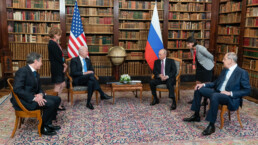The chances of this widening into a much more devastating conflict demands the West explore what may be possible.
By Harry Kazianis, Responsible Statecraft
U.S. foreign policy is filled with overused and tiresome cliches designed to resonate with a preferred partisan audience. For example, hawks like to label any resistance to aggressive strategy “appeasement,” or say that world leader X is “weak” or Y politician has “no strategy” towards whatever the foreign “threat” of the day may be.
We hide behind these phrases and tropes and often substitute toughness and machismo for what is needed most of the time — and that’s talking, complicated negotiations, and compromise.

All of this is precisely what is happening today with regard to Russia’s war of aggression against Ukraine and why the United States and its allies won’t do the one thing that might help end the bloodshed: talk to Moscow.
Clearly, Washington and its allies should be finding ways to open up communications with Russian President Putin to try to end the fighting — hard and politically difficult that will be, given his latest annexation of Ukrainian territory and jeremiad lambasting the United States and the West on Friday. But it is nonetheless clearly in our national interest to do so. Right now, new sanctions and and even a new U.S.-led military command are being set up for the long hard slog, but what about back-channel diplomacy?
Recent Posts
‘Unconstitutional. Unethical. Authoritarian.’ ICE Bars Millions Of Immigrants From Bond Hearings
July 18, 2025
Take Action Now One watchdog said the new policy “seems like a blatant attempt to stop them from exercising their right to due process.”……
Americans Are Not Nearly Alarmed Enough About Climate Change
July 18, 2025
Take Action Now Americans still don’t comprehend how imminent, dangerous, and far-reaching the threat is—and journalists are partly to blame.By…
The IRS Is Building A Vast System To Share Millions Of Taxpayers’ Data With ICE
July 17, 2025
Take Action Now ProPublica has obtained the blueprint for the Trump administration’s unprecedented plan to turn over IRS records to Homeland Security…
Israel’s Sudden Assault On Syria Is Unchecked Aggression
July 17, 2025
Take Action Now Jerusalem is bombing Damascus and threatening al-Sharaa’s rule, while Washington was hoping to help the nascent government on…




